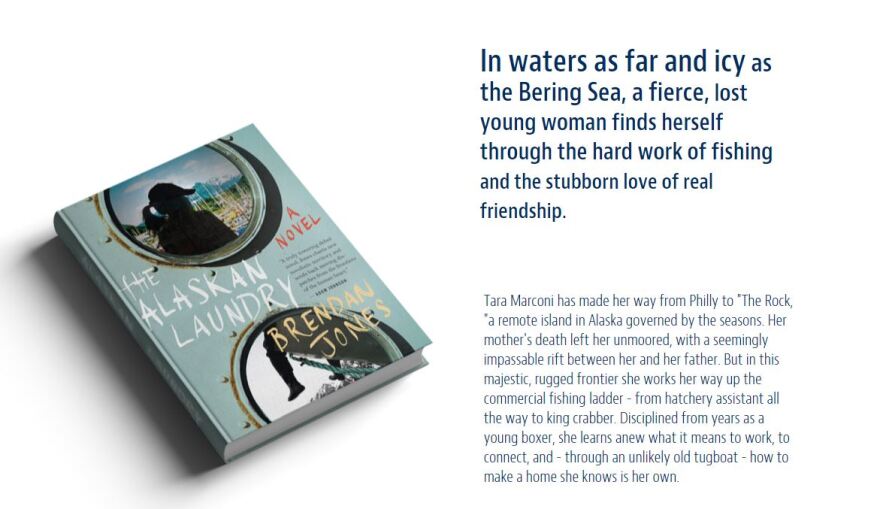A novel released this spring offers a glimpse into familiar Alaska themes: moving to Alaska, a first season as a greenhorn, and falling in love with a harsh land.
The Alaskan Laundry is a coming of age story about Tara Marconi - a young woman who moves from an east coast city to a fictional Alaska island town, and works her way up the fishing industry ladder: hatchery, processor, crewman. But it’s also a musing on Alaska, growing up, fishing – life – through the lens of each character.
And no, The Alaskan Laundry does not feature a laundromat. Jones said the title came from a one-off conversation with a pickled old fisherman, who shared his theory on Alaska.
“The state is very much like a laundry, where a lot of folks come in, and they think they can get themselves clean. It’s on one continuous wash cycle,” Jones said the fisherman told him. “ … THey have high expectations and of course that doesn’t generally work out. Not to mention, of course, that there have been people in the state for thousands of years.”
The Alaskan Laundry was written in Sitka and California, over several years. Jones says from time to time he’d go fishing, and then come home to re-write a section. The book developed in bits and pieces here and there. Tara’s story was not necessarily the one Jones set out to tell. There were nearly a dozen characters to start, and then they got knocked out one by one, until it was just a love story between Tara and a Cuban man. Then it took it’s more final shape.
It does, however, share some commonalities with Jones’ life. He moved to Alaska, from Philadelphia, at age 19. He’s moved around a bit in the years since then, but now, just like his protagonist, calls a tugboat anchored near a rocky Alaska island home. He’s fished in a handful of fisheries – mostly trolling for salmon in Sitka, though some time tendering for dive cucumber fisheries and out crabbing in Southeast.
Although Jones has experience in several fisheries, he’s never been out to crab in the Bering Sea. Despite that, it was one of the easiest parts to write, he said. But his favorite parts are when writing is more lyricism than the heavy lifting of narrative.
“I’m always drawn to the more poetic sections,” he said. “I have this belief where if you’re good enough at getting the actions of your characters and moving them around in effective ways, then you get rewarded with just like these flights of writing and they kind of drop into your lap.”
Jones has taken the book from eastern cities, New York and Boston and D.C. and Philadelphia, to Alaska towns like Anchorage, Homer, Palmer Juneau – and stops at other places between.
“I end up reading very different sections for a place like Homer, Sitka, than I do for say like Los Angeles, where people don’t really read anyways, so you have to read very slowly and figure out a very simple passage to share with them,” he said. “In Alaska, people are so familiar with the rudiments of fishing that you can just dive right into it, so I pick out certain sections that I think will resonate and don’t spend a whole lot of time explaining the industry or what it’s like to come to Alaska as a young person ‘cause so many people have already had those experiences, already kind of seeded in people.”
And in Alaska, Jones said he connects with people over their own stories of learning to fish, coming to Alaska.
“One of the great pleasures of writing is it’s such a solitary venture, but it’s a story, so you get to share it,” he said. “And so I’ve met all sorts of people and it’s been fascinating to see how the stories hit them and resonated with them. I really tried to write it in such a way that people could connect their own dots. I didn’t want to force truths or anything down people’s throats. So I think people brought their own stories to the novel and took a lot out of it.”


